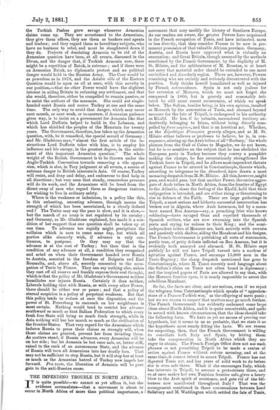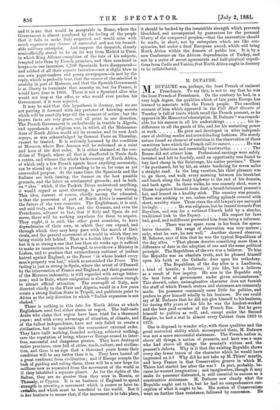THE IMPENDING TROUBLE IN NORTH AFRICA.
IT is quite possible-we cannot as yet affirm it, but the evidence accumulates—that a movement is about to occur in North Africa of more than political importance, a movement that may modify the history of Southern Europe. As our readers are aware, the greater Powers have acquiesced in the French occupation of Tunis, and have intimated, more or less directly, that they consider France to be now in per- manent possession of that valuable African province. Germany, Austria, and Russia have approved what is virtually an annexation ; and Great Britain, though annoyed by the methods sanctioned by the French Government, by the duplicity of M. St. Hilaire, and the arbitrariness of M. Roustan, is at heart not sorry that material order should be extended to one more uncivilised and disorderly region. There are, however, Powers remaining who are entirely and seriously discontented with the position. Italy thinks herself humiliated as well as injured by French outrecui dance. Spain is not only jealous for her reversion of Morocco, which we must not forget she conquered in 1860, but is gravely and reasonably irri- tated by still more recent occurrences, of which we speak below. The Sultan, besides being, in his own opinion, insulted as Monarch by the annexation of Tunis, and alarmed beyond measure for the fate of Tripoli, is endangered in his authority as Khalif. He has, if he submits, surrendered territory un- doubtedly belonging to Islam, without being directly com- pelled by pree nwjeure, and that is an heretical act. Whether, as the Republique Frangaise gravely alleges, and as M. St. Hilaire either believes or professes to believe, he is, in con- sequence, stirring up the Arab tribes of all "Barbary," the whole plateau from the Gulf of Cabes to Mogador, we do not know, but he is so sensitive on the subject that he has abolished the European posts in Turkey because they convey a pamphlet making the charge, he has ostentatiously strengthened the Turkish force in Tripoli, and he allows most imprudent threats against France to be uttered in Constantinople, threats which, according to telegrams to the Standard, have drawn a most menacing despatch from M. St. Hilaire. All this, however,might pass, and would pass, but that another Power, the entire aggre- gate of Arab tribes in North Africa, from the frontier of Egypt to the Atlantic, share the feeling of the Khalif, hold that their subjugation is intended, and are either rising or threatening to rise in defence of the Faith. There are large gatherings in Tripoli, a most serious and hitherto successful insurrection has broken out in Algeria, where Arab horsemen, led by a mara- bout named Bou Amema—say, a preaching friar who knows soldiering—have ravaged Oran and expelled thousands of Spanish settlers, who are now swarming into the Spanish ports and crying for redress to their King ; and the semi- independent tribes of Morocco are, both actively with recruits and passively with shelter, aiding the Marabout and his designs. The French Government is publishing all sorts of statements,. partly true, of petty defeats inflicted on Bou Amema, but it is evidently both annoyed and alarmed. M. St. Hilaire says publicly he will not have Tripoli turned into a nucleus of agitation against France, and encamps 15,000 men in the Tunis Regency ; the sharp despatch mentioned has gone to Constantinople, where M. Tissot recently used language about the Sultan's claim on Tunis not often heard in diplomacy and the inspired papers of Paris are allowed to say that, with the Morocco frontier open, it is nearly impossible to arrest the- rebellious Marabout.
So far, the facts are clear, and are serious, even if we reject the telegram from Constantinople which speaks of " apprehen- sions of a Franco-Turkish war," as the offspring of mere panic ; but we see reason to suspect that matters may go much farther. The French Government has evidently embraced some large ideas. about North Africa, and it is quite conceivable, and quite in accord with known circumstances, that the ideas should take the following form. We have as yet no means of proving our hypothesis, but it seems to us so probable, that we state it as the hypothesis most nearly fitting the facts. We see reason for suspecting, then, that the French Government is willing to conciliate both Italy and Spain, by letting them take the compensation in North Africa which they are eager to obtain. The French Foreign Office does not use such phrases as not permitting Tripoli to be made a centre of action against France without serious meaning, and at the same time, it cannot intend to annex Tripoli. France has not digested Tunis yet, and has years of solid work to do before she is even safe there. What if she encourages Italy, which has interests in Tripoli, to assume a protectorate there,'and so at once makes her own Tunisian frontier safe, gives a heavy blow to the Arab spirit of resistance, and gets rid of the bit- terness now manifested throughout ,Italy? That was• the arrangement mentioned in those conversations between Lord Salisbury and M. Waddington which settled the fate of Tunits, and it is one that would be acceptable in Rome, where the Government is almost paralysed by the feeling of the people that it fails to make Italy respected, and would seize with much eagerness any chance of successful and not too formid- able military enterprise. And suppose the despatch, already semi-officially stated to be on its way from Madrid to Paris, in which King Alfonso complains of the fate of his subjects, tempted into Oran by French promises, and then murdered in
heaps—in one incursion, 1,700 Spaniards have disappeared—
and robbed of all their esparto factories—not a slight blow to our own paper-makers and penny newspapers—is met by the reply, which is perfectly true, that the source of the mischief is anarchy in part of Morocco, and that the Spanish Government is at liberty to terminate that anarchy as, but for France, it would have done in 1860. There is not a Spaniard alive who would not leap at the offer, or who would ever pardon his Government, if it were rejected.
It may be said that this hypothesis is dreamy, and we are not putting it forward with any pretence of knowing secrets which will be carefully kept till the moment of action ; but the known facts are very grave, and all point in one direction. The French Government is undoubtedly in trouble in Algeria, and apprehends a religious war, in which all the Mahomme- dans of North Africa would aid its enemies, and its own Arab sepoys, as was acknowledged by General Farre on Thursday, cannot be trusted. It is seriously harassed by the condition of Morocco, where Bou Amema will be welcomed as a saint and hero of the first order. It is either alarmed at the con- dition of Tripoli, where all that is disaffected in Tunis finds a centre, and whence the whole back-country of North Africa, of which only a few French agents know anything accurately, can be stirred up, or it is pretending to be so, for some as yet unrevealed purpose. At the same time, the Spaniards and the Italians are both fuming, the former on the best possible grounds, and the latter on sentimental grounds; and in both, an " idea " which, if the Turkish Divan understood anything, it would regard as most alarming, is growing very strong. This idea, current, of course, chiefly among the educated, is that the possession of part of North Africa is essential to the future of the two countries. The Englishman, it is said,
and said truly, and the Slav, and the German, and even the Frenchman, advance so fast, that if Italy and Spain do not move, there will be nothing anywhere for them to acquire. They ought, it is said, like other great countries, to have dependencies of their own, in which they can expand, and through which they may keep pace with the march of their rivals, and the general movement of a world in which they are being visibly left behind. That is a foolish idea ? Very likely, but it is so strong a one that less than six weeks ago it sufficed to make an insurrection in Portugal, to overthrow a Ministry in Lisbon, and to produce that extraordinary outburst of jealous hatred against England, as the Power "in whose basket every man's property was lost," which so astonished the Times. The feeling is just as strong in Spain, where the arrest of O'Donnell by the intervention of France and England, and their guarantee of the Morocco indemnity, is still regarded with savage bitter- ness ; and in Italy, where emigration is already serious enough to attract official attention. The over-spill of Italy, now ,directed chiefly to the Plate and Algeria, would in a few years create a strong Italian State in Tripoli, and publicists point to Africa as the only direction in which "Italian expansion is not choked."
There is nothing in this fate for North Africa at which Englishmen need feel either alarm or regret. The half-caste Arabs who claim that region have been tried for a thousand yeara; and with every advantage of situation, of climate, and of the fullest independence, have not only failed to create a civilisation, but to maintain the commonest external order. They have built nothing, founded nothing, achieved nothing, save the reputation of being, whenever Europe ceased to inter- fere, successful and dangerous pirates. They have destroyed entire provinces, once full of cities, roads, culture, and civilisa- tion, and there is no sign that a thousand years hence their condition will be any better than it is. They have barred off a great continent from civilisation ; and if Europe accepts the task of guiding and ruling them, there will be a new hope for millions now as separated from the movement of the world as if they inhabited a separate planet. As for the rights of the Sultan, they are no greater than they were in Bosnia, or Thessaly, or Cyprus. It is no business of England to spend -strength in arresting a movement which is sooner or later in- imitable, and which must be beneficial to the world. But it is her business to secure that, if the movement is to take place,
it should be backed by the irresistible strength which prevents bloodshed, and accompanied by guarantees for the personal liberty of the conquered peoples,—that the annexation should be made, in short, not by enterprises which are like con- spiracies, but under a final European award, which will bring North Africa within the domain of public law. It is by a new Conference on the African dependencies of Turkey, and not by a series of secret agreements and half-piratical expedi- tions from Cadiz and Venice, that North Africa ought in decency to be redistributed.



































 Previous page
Previous page